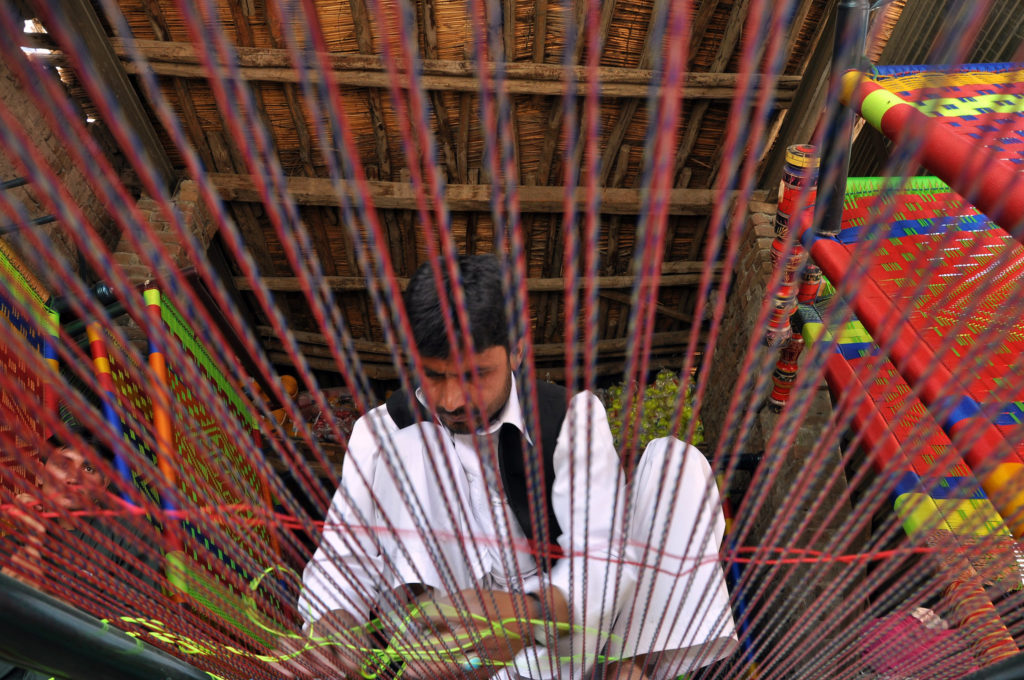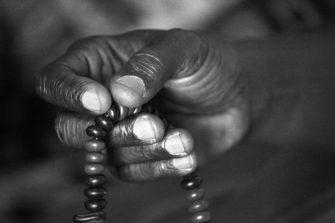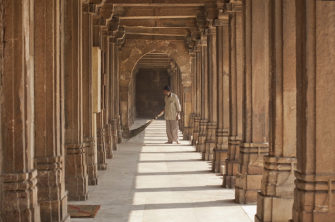
Why are Sufis imagined as apolitical? Why are the theological and the political realms purportedly opposed? Why does Islamic reform provoke deep anxieties of force and violence? Why are madrassas thought to be hotbeds of religious insurgency? SherAli Tareen’s new book Defending Muḥammad in Modernity reveals these questions for what they are: a function of secular translation in which a modern notion of “the political” is wielded against Islam to secure the global secular politics of religion. Islam is, after all, an entity, as Gil Anidjar has argued, which has historically been phobically imagined by the West as the enemy. Indeed, Islam becomes the very ground through which Europe-as-Christian launches itself into Europe-as-political. Here Islam features as a figure of a certain kind of “beyond” of politics in which the political itself is “put under question from a certain outside” (49). Islam emerges, not simply as a theological enemy or even a political enemy, but as an enemy to the very notion of the political itself in the modern world. An exemplary enemy of the capacity to be political as such.
Against the tyranny of such a modern notion of the political, Tareen’s book is a comprehensive interrogation of how various competing imaginaries, in their attempts to cohere the boundaries of Islam, reveal Muslim ethico-moral-political commitments. These 19th century debates between South Asian Barelvī and Deobandī ‘ulamā’ show that questions related to God’s sovereignty, the Prophet’s authority, heretic innovation, food and contamination, prayer gatherings, death-associated rituals, and so on, reveal how ceaseless contestation that aspires to make a tradition cohere “enables a shared form of life” (13). Tareen disrupts discourses that identify Barelvīs with a Sufi tendency in Islam and Deobandīs with a legalistic reform-driven tendency, and instead shows that Sufis were no less interested in reform or the juridical totality of sharīʿa, and that Deobandī scholars were also major Sufi masters. Tareen, thus, labors against the insistence upon translating this “form of life” into religious versus political or mystical versus orthodox. Following Talal Asad, the insistence on these binaries risks instrumentalizing the “ambivalences and gridlocks that exist in our collective” (11)—a reduction in which “the native’s point of view” becomes “merely information to be translated for a purpose entirely foreign to it.” (9)
Against this neat excision of indeterminacy and opaqueness from a form of life, the contestations between these ‘ulamā’ reveal deep investments in the question of what constitutes the ethico-moral-political life of a community. By this Tareen does not simplistically mean that “religion” is “political,” a claim which returns the secular political to us in a redoubled way, using a logic of substitution rather than bringing into question the founding possibility that launches one into the binary. Derrida labels this “the problem of the status of a discourse which borrows from a heritage the resources necessary for the deconstruction of that heritage itself” (282). Rather, grappling with the history of Western political theology, I wish to foreground a question resonant in Tareen’s book: Is Islamic political theology simply Islamic “political theology”?
The Logic of Encounter
To get past the sleight of hand (religion is political), which reinstalls the modern academic as arbitrator and sovereign decider, Tareen suggests another ethics, one of listening to a multivocal tradition: a reading that practices humility and attention in reckoning with an internal otherness. He sets up the book’s challenge as one of an openness to the unknown, echoing a sentiment that Stefania Pandolfo elsewhere has called a “vision of blindness” in which “the mastery of the plot must be surrendered, and exchanged for trust in the guidance of the Other” (15). Indeed tradition, as Tareen notes via Talal Asad, is about a story of encounter not communication. The logic of encounter insists that one give up the fantasy of transparent meaning, and submit to a radical alterity which admits that one has always already been inhabited by the discourse of the Other. Such an ethical orientation to history writing, as Omnia El Shakry has suggested, might even allow a secular discipline to begin “encountering [its] own disappearance” in the process (174).
If not within the binaries of religion/politics, mystic/reformist, belief/knowledge, how then is one to speak intelligibly of the meaningful category of Islam? If the historian should not be a sovereign decider of Islam, taking a god’s eye view between various polemics to decide where orthodoxy lies, it would also be misleading to claim that any exploratory practice a Muslim engages in with the goal of it being Islamic is an Islamic practice. How then to speak of Islam—especially in a time structured by a deathly paranoia against Islam, or as Freud has termed, our “times of war and death”? Why turn to the past?
The Gift in Inheritance and Tradition
Tareen takes his cue from Asad’s genealogical method to interrogate the Islamic discursive tradition, though he does it “through a route different than that of offering another genealogical critique of the secular. Instead [the book] has tried to shift inquiry from secular colonial regimes of ‘religion making’ to critical conjunctures of authoritative native discourses and debates on the boundaries of religion” (380). Exploring these Barelvī-Deobandī debates about the boundaries and limits of Islam allows Tareen to remind us of David Scott’s famous lesson: “Tradition is not merely an inheritance” available for simple recovery (115; Tareen, 382). Indeed, one might add that inheritance is never simple to begin with as Freud has demonstrated for us through an analysis of the inheritance of the unconscious (35). More than an Oedipal drama that would allow a tracing back to origins, an inheritance is collective, a layer upon unconscious layer of the lacuna of the unknown, around which human attempts at meaning circumambulate. All inheritance, then, is of the order of the gift and remains mysterious as to its origins. And a true gift, à la Derrida, is precisely what cannot be recognized as gift (29). A gift, already something forgetful or unconcerned of its origins, outside the logic of economy and exchange, is without expectation or possibility of return. Perhaps it is possible to conceptualize the inheritance of tradition in this mode of a gift. It is a task, and one that requires a different kind of work than mere recovery. To retrain the eye on the unpast of the importance of the polemics that Tareen highlights is vital, especially in a moment of reductionist discourse about good/bad Islam. In fact, the task of the critical historian then is not the recovery of an authentic indigenous debate but to deal with the unpastness of the past, the unsettled question of tradition, and as Walter Benjamin poignantly framed it, “to seize hold of a memory as it flashes up at a moment of danger” (255).

Staying with this “adventure of the trace” (292), giving up a search for a decidable finite origin, Tareen’s book instead demonstrates how moral reasoning for both Barelvīs and Deobandīs revolved around the lacuna of the unknowable—the knowledge of al Ghayb, mutually agreed upon to be possessed only by the Divine. The debates, however, centered on identifying the capacity of others, especially God’s beloved, the Prophet, to be gifted knowledge of al Ghayb. These questions had less to do with an uncomplicated inheritance than with the reliability of possible custodians and guides of such an inheritance. The questions that were fiercely argued over were the capacity for gift receiving, the status of the receiver in question, the matter of whether status is linked to receiving or not, the capacity also for gift giving (whether rewards for prayers could be gifted to the dead), and so on. At the heart of these debates were competing imaginaries of what knowledge is and of the hierarchy of such a knowledge—a question that necessitates a distinction between the conceptual use of hierarchies as opposed to binaries.[1] This recognition of hierarchical power in Islam provides an important counter to the simplistic celebration of the purported (though never-possible) egalitarian subject of modern power. Submitted thus to the absolute alterity of the Divine, in this conception of heteronomous ethics, the subject secures agency through submission to the Unknown.[2]
The Gap in Power and Politics
How might this notion of Divine sovereignty be understood alongside the sovereignty of the colonial state as well as the declining sovereignty of 19th century Muslims in the subcontinent? Is the understanding of power within Islam similar or different than what the colonial encounter brought? Tareen argues that Islam’s encounter with colonial secularism is to be understood not through a logic of capture but rather one of haunting: “While haunted by colonial power, the grammar of that hauntology was distinctive and particular” (161). He is careful to note that he is not interested here in a project of recovery of indigenous thought or native agency. But attention to the particularity of the grammar of the Barelvī-Deobandī polemic allows an understanding of sovereignty as these ‘ulamā’ imagined it through the sharīʿa, one that was not overdetermined by the colonial context and tied neither to the idea of a nation-state nor to the idea of a caliphal state. By this Tareen does not mean that Barelvīs or Deobandīs were not interested in “the political” as it manifests in state form. Rather, salient is the fact that the state was just one manifestation of power and politics for these ‘ulamā’. I take the example here of one reformer, Shāh Muḥammad Ismāʿīl, who distinguished between what he called siyāsat-i īmānī (politics of salvation) and siyāsat-i sulṭānī (imperial politics). While salvational politics was concerned with moral cultivation central to community life, the “driving force of imperial politics was the commanding ego-self (nafs-i ammāra)” (107). The more a leader gave in to the ego-self, the more corrupt and distant from salvational politics the political order became. In both conceptions of politics, power was imagined as a continuous struggle between the desiring self and the Divine Other, a continuous internal battle of the nafs (variously translated as soul/ego/psyche) which was to be cultivated toward more ethical frontiers through a moral community life. Further, considerations of both these forms of the political were not unconnected to Muslims’ declining power in the colonial encounter, which haunted the debates about the ethical risk inherent to a desiring subjectivity as well as competing understandings of temporality, corruption, and decline of tradition. Tareen’s analysis shows a reckoning of the political which contended with the temporality of the world, but remained aspirationally open to the temporality of the Elsewhere.
Such a notion of politics reckons with the full extent of ambiguity as a productive force within the sharīʿa, giving rise to multiple heated debates around claims on the normative. Which is not to say Tareen is suggesting we adopt “openness,” “fluidity,” or “complexity” in relation to Islam—all categories vested with liberal aspirations of making Islam compatible to modern secular values of the good. Rather, we can understand that the sharīʿa, for these ‘ulamā’, was framed around a core of an Absolutely Other unknowable Divine, around which disputation and contestation make claims on the normative. As Rajbir Singh Judge too has argued, the goal in sharīʿa is not to close the constitutive “gap” between past authority and present application, “but to wallow in its opening” (180). In the absence of a centralizing authority (such as the Roman Catholic Church) in Islam, no final word could be produced on a locatable orthodoxy. Instead, Islam emerges as a tradition that coheres itself via authoritative discourses that compete to interpret what the normative model of sharīʿa is, organized around an unknowable kernel of al Ghayb, the Unknown, of which only the Divine maintains full knowledge. The subject of this heteronomous law is imagined as engaged in a repetitive struggle, “holding on to God’s rope” (Tareen, 188). And yet, we should not forget that the final word could be produced, and was repeatedly, by the arbitration of British colonial law, which alternatively banned, allowed, or “protected” Deobandī ‘ulamā’ at times, and Barelvī at others. “Defending Muḥammad” as a practice embedded in the Islamic discursive tradition takes on a different force when the defense must be produced in modernity when decision is possible. Tareen thus presents the problem of modern sovereignty as precisely one that wishes to foreclose any indeterminacy and opaqueness inherent to a form of life.
The Impossibility of Arbitration

A fuller examination of similarities and differences in contestation of boundaries of Islam and the boundaries of the modern state, its law, and the ability to enact exception remains to be undertaken. However, to continue questioning down this road, the task of the critical historian must be, as Omnia El Shakry has argued, not of endless historicization but of how one might contemplate one’s own psychic stakes in one’s objects of study and ethically encircle the distance from the radical unknowability of our deathly enjoyments in our catastrophic times.[3] This caution is no less relevant for the ethnographer, for as Jeanne Favret-Saada has famously argued, one cannot be both participant and mere observer at the same time; the only players of a game are those “caught” within it, spoken through and possessed by the full force of language at all times. There is no outside/neutral position from which to arbitrate, mix and match different Deobandī or Barelvī ideas to arrive at a Sufi or reformist Islam—a position that would be deeply trapped in the modern secular notion of choice. Giving up the secular fantasy of neutral “outside-the-game” arbitrating ground necessitates that one lose the role of sovereign decider and contemplate the impossibility of producing a final answer. To understand how 19th century Muslims related to what they did not know, how they imagined reforming the community, experienced anxieties over the loss of public markers of Islam, were possessed by a vivid gastronomic imagination of the threat of contagion living in proximity to unbelief, and negotiated curtailed futures in a moment of colonial onslaught one must ask not whether these actors were interested in politics or simply mired in debates of internal reform (again questions that cannot be unlinked). Rather, we must ask how we might turn the question back to ourselves to ask about the founding mystification that produces this binaristic interrogation that then intensifies in our current moment of a global war on Islam. Even as Tareen’s interlocuters attempt to “defend” Muḥammad in the encounter with modernity, their central challenge to the reader emerges as one of continuously calling into question the settled nature of the terms themselves with which one might translate this form of life.
[1] Distinguishing between the conceptual use of hierarchies as opposed to binaries, Tareen shows that the modern academic’s suspicion of all power has perhaps neglected to fully interrogate the productive force of Foucault’s famous lesson on the cultivation of ethical subjectivities being a function of hierarchical power.
[2] Here, Tareen is building on Saba Mahmood’s renowned work on the false equation of submission to lack of agency. See, Saba Mahmood, Politics of Piety: The Islamic Revival and the Feminist Subject. Princeton University Press, 2011.
[3] Omnia El Shakry, “History and Lesser Death,” eds. Ethan Kleinberg, Joan Wallach Scott, and Gary Wilder. “Theses on Theory and History” in History of the Present (2018). See also, Omnia El Shakry, The Arabic Freud: Psychoanalysis and Islam in Modern Egypt. Princeton University Press, 2017.


A marvelous essay. Thank you very much. I like the distinction drawn between imperial and salvational politics. I wonder if the suspicion of a number of ulama with the modern state, and their subsequent withdrawal from it to focus on moral cultivation, rather than being interpreted as quietism, actually shows an awareness that this technocratic state does not allow space for the organic cultivation of virtues. In addition the ulama, of course, could incorporate what was happening to them in terms of their own world view, which as you have indicated is based on different temperal considerations and this hold true to the present. In any case, the essay has prompted me to look forward to engage in Tareen’s work.